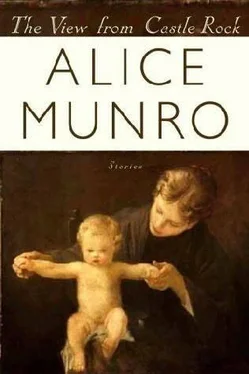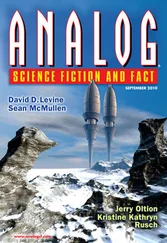“But she had,” he said. “She had it.” And the tone in which he said this convinced me that he had never shared those reservations of my grandmother’s and mine. Or that he’d resolutely put away such shame, if he’d ever had it.
A shame that has come full circle, finally being shameful in itself to me.
On a spring evening in 1949-the last spring, in fact the last whole season, that I was to live at home-I was riding my bicycle to the Foundry, to deliver a message to my father. I seldom rode my bicycle anymore. For a while, maybe all through the fifties, it was considered eccentric for any girl to be riding a bicycle after she was old enough, say, to wear a brassiere. But to get to the Foundry I could travel on back roads, I didn’t have to go through town.
My father had started working in the Foundry in 1947. It had become apparent the year before that not just our fox farm but the whole fur-farming industry was going downhill very fast. Perhaps the mink would have tided us over if we had gone more heavily into mink, or if we had not owed so much money still, to the feed company, to my grandmother, to the bank. As it was, mink could not save us. My father had made the mistake many fox farmers made just at that time. It was believed that a new paler kind of fox, called a platinum, was going to save the day, and with borrowed money my father had bought two male breeders, one an almost snowy-white Norwegian platinum and one called a pearl platinum, a lovely bluish-gray. People were sick of silver foxes, but surely with these beauties the market would revive.
Of course there is always the chance, with a new male, of how well he will perform, and how many of the offspring will have their father’s color. I think there was trouble on both fronts, though my mother would not allow questions or household talk about these matters. I think one of the males had a standoffish nature and another sired mostly dark litters. It did not matter much, because the fashion went against longhaired furs altogether.
When my father went looking for a job it was necessary to find a night job, because he had to spend all day going out of business. He had to pelt all the animals and sell the pelts for whatever he could get and he had to tear down the guard fence, the Old Sheds and the New Sheds, and all the pens. I suppose he did not have to do that immediately, but he must have wanted all traces of the enterprise destroyed.
He got a job as night watchman at the Foundry, covering the hours from five in the afternoon till ten o’clock in the evening. There was not so much money in being a night watchman, but the good fortune in it was that he was able to do another job at that time as well. This extra job was called shaking down floors. He was never finished with it when his watchman’s shift was over, and sometimes he got home after midnight.
The message I was taking to my father was not an important message, but it was important in our family life. It was simply a reminder that he must not forget to call in at my grandmother’s house on his way home from work, no matter how late he was. My grandmother had moved to our town, with her sister, so that she could be useful to us. She baked pies and muffins and mended our clothes and darned my father’s and my brother’s socks. My father was supposed to go around by her house in town after work, to pick up these things, and have a cup of tea with her, but often he forgot. She would sit up knitting, dozing under the light, listening to the radio, until the Canadian radio stations went off at midnight and she would find herself picking up distant news reports, American jazz. She would wait and wait and my father wouldn’t come. This had happened last night, so tonight at suppertime she had phoned and asked with painful tact, “Was it tonight or last night your father was supposed to come?”
“I don’t know,” I said.
I always felt that something had not been done right, or not done at all, when I heard my grandmother’s voice. I felt that our family had failed her. She was still energetic, she looked after her house and yard, she could still carry armchairs upstairs, and she had my great-aunt’s company, but she needed something more-more gratitude, more compliance, than she ever got.
“Well, I sat up for him last night, but he didn’t come.”
“He must be coming tonight then.” I did not want to spend time talking to her because I was preparing for my Grade Thirteen exams on which my whole future would depend. (Even now, on cool bright spring evenings, with the leaves just out on the trees, I can feel the stirring of expectation connected with this momentous old event, my ambition roused and quivering like a fresh blade to meet it.)
I told my mother what the call was about and she said, “Oh, you’d better ride up and remind your father, or there’ll be trouble.”
Whenever she had to deal with the problem of my grandmother’s touchiness my mother brightened up, as if she had got back some competence or importance in our family. She had Parkinson’s disease. It had been overtaking her for some time with erratic symptoms but had recently been diagnosed and pronounced incurable. Its progress took up more and more of her attention. She could no longer walk or eat or talk normally-her body was stiffening out of her control. But she had a long time yet to live.
When she said something like this about the situation with my grandmother-when she said anything that showed an awareness of other people, or even of the work around the house, I felt my heart soften towards her. But when she finished up with a reference to herself, as she did this time (and that will upset me), I hardened again, angry at her for her abdication, sick of her self-absorption, which seemed so flagrant, so improper in a mother.
I had never been to the Foundry in the two years my father had worked there, and I did not know where to find him. Girls of my age did not hang around men’s workplaces. If they did that, if they went for long walks by themselves along the railway track or the river, or if they bicycled alone on the country roads (I did these last two things) they were sometimes said to be asking for it.
I did not have much interest in my father’s work at the Foundry, anyway. I had never expected the fox farm to make us rich, but at least it made us unique and independent. When I thought of my father working in the Foundry I felt that he had suffered a great defeat. My mother felt the same way. Your father is loo fine for that, she would say. But instead of agreeing with her I would argue, intimating that she did not like being an ordinary workingman’s wife and that she was a snob.
The thing that most upset my mother was receiving the Foundry’s Christmas basket of fruit, nuts, and candy. She could not bear to be on the receiving, not the distributing, end of that sort of thing, and the first time it happened we had to put the basket in the car and drive down the road to a family she had picked out as suitable recipients. By the next Christmas her authority had weakened and I broke into the basket, declaring that we needed treats as much as anybody. She wiped away tears at my hard tone, and I ate the chocolate, which was old and brittle and turning gray.
I could not see any light in the Foundry buildings. The windows were painted blue on the inside-perhaps a light would not get through. The office was an old brick house at the end of the long main building, and there I saw a light through the Venetian blinds, and I thought that the manager or one of the office staff must be working late. If I knocked they would tell me where my father was. But when I looked through the little window in the door I saw that it was my father in there. He was alone, and he was scrubbing the floor.
Читать дальше












